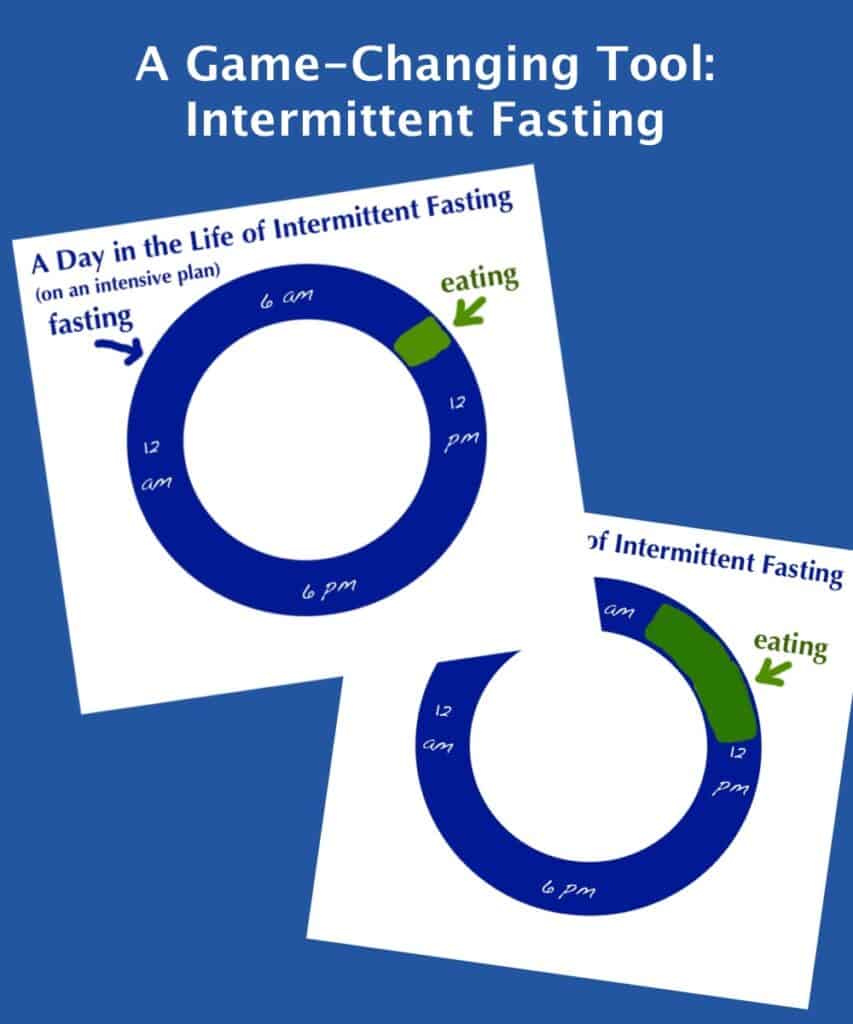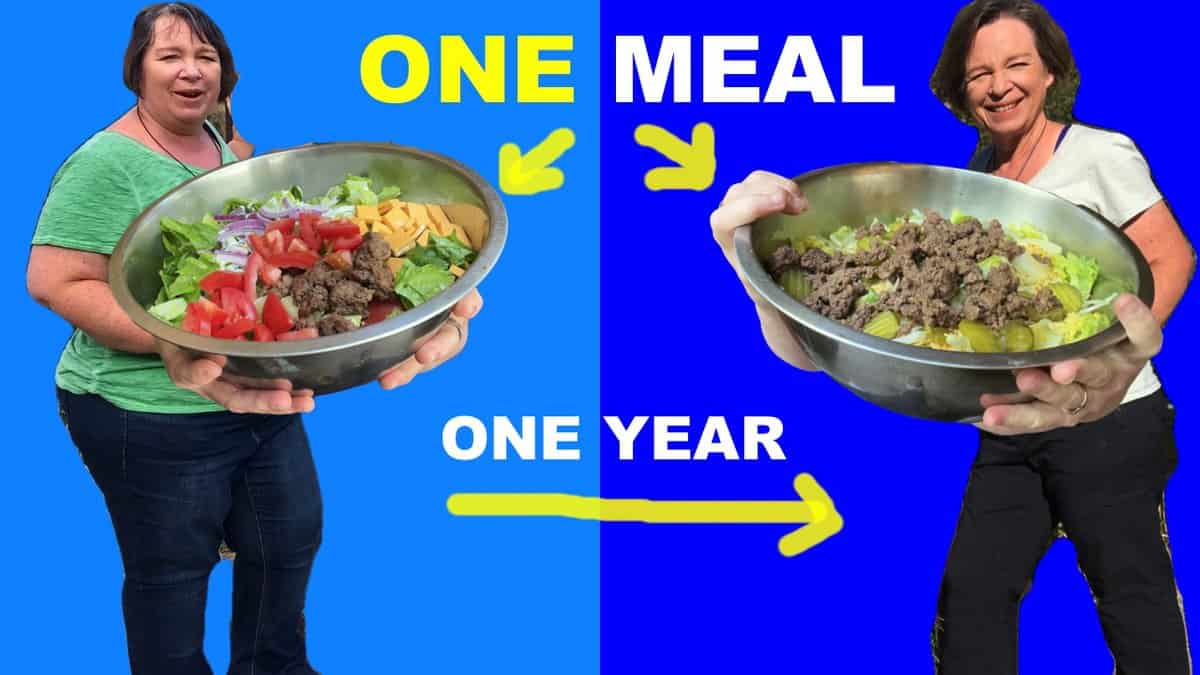Intermittent Fasting Results: Set Your Weight Loss On Fire!
Can you really get massive weight loss results with intermittent fasting?
Really?
Intermittent fasting is just about timing your food.
It is about “when to eat.”
How can “that”when to eat” possibly help with weight loss?
Further: What about eating only one meal a day? That sounds straight-up CRAZY!
I know it sounds totally crazy and you may have just found us here at Eat Like a Bear, so let me give you a bit of evidence that we know what we’re talking about.
We are legit weight loss bad asses
First, look at us in Yahoo News in the summer of 2023. We made the news because we have an historic level of 100+ pound weight loss cases. (Click here for that bad assery.)
***bow****
We’ve actually made the news a good bit and that may be how you found us.
Here’s a fun appearance in Yuma, Arizona, the wintertime produce capital of the world.
So, buckle up and prepare for your life to change….
What is this crazy thing – intermittent fasting?
Weight loss typically focuses on what to eat, and what to eat is very important, but we can set our results on fire if we also consider when to eat.
Intermittent fasting is simply putting your eating on a schedule wherein there are hours in the day in which you are purposefully eating and hours in the day when you are purposefully not eating.
Way back when I founded Eat Like a Bear, I held up these graphics in the videos, showing the different sorts of ways to think about intermittent fasting.

The two examples in the graphic are fairly hard core — in one, you eat all of your nutrition in our hour (!!!!) and in the other, you eat it all in five hours (!!!!)
For someone used to grabbing food when they wake up at 6:00 am and continuing to snack until they go to bed at midnight, this is a very big change.
(Eating from 6 am to midnight is an 18-hour eating window with only six hours of “not eating.” Our examples above include not eating for 23 hours and 19 hours respectively.)
Whoa.
That’s a HUGE difference!
Yes, it sure is, and that difference could change your life.
Probably 90% of the community members of Eat Like a Bear implement one of the models in the graphic above. Our popular Three-Day Challenge exposes you to the one meal a day model, which is what I did to lose 140 pounds.
The focus of my learning content here at Eat Like a Bear is on the one meal model. It was the way I lost weight, it drives a lot of success in the community, and it sure helps to have support when you’re implementing something so different.
All the concerns about intermittent fasting and, especially, one meal a day
Over the first five years of Eat Like a Bear and its thousands of weight loss success cases, we get A LOT of questions about this whole intermittent fasting thing.
I MOST DEFINITELY had my own concerns back in 2017 and was a bit FREAKED OUT by it all.
It surely didn’t seem like it would work.
I made this video with the top concerns
Key take-aways from the video
Hunger is actually easier not harder with a smaller eating window.
That’s soooo counter-intuitive. I get it.
What you eat today trains you for that hunger tomorrow, so if you’re up drinking beer and eating chips at 9 pm today, you will be ravenously hungry to do the same thing tomorrow.
You’re not going to be all HANGRY
Don’t get me wrong, if you keep thinking about food all day long, you’re going to want to keep eating. However, all that terrible hunger of wanting to eat your arm off? That gets under control when you put a boundary on the eating.
Train yourself today when to be hungry tomorrow.
I do get pretty darned hungry these days when it’s time to eat. I eat to satisfaction and walk away from the food.
I purposefully shut off the food thoughts and go off and engage in other awesome activities that do not involve food.
You’re metabolism isn’t going to slow
We see no evidence of this problem in our community, here five years out.
If you’re effectively living off that stored fat of yours, you have plenty of fuel for the road.
You may end up requiring fewer calories, however. This is sometimes confused with a slowed metabolism.
Do you know why you may need fewer calories in the future?
Because, if you’re like me, having carried around an extra whopping 140 pounds, my body simply needs more fuel today to support my smaller frame.
At 280 I could maintain my weight on bigger meals because I was lugging around all those extra pounds.
No, you’re not sad and pathetic missing all those meals
Who even comes up with this stuff?
I definitely get comments: Eating like this is not living.
Don’t be sad for me, over here not eating all day long.
I’m living better than I ever lived in the 48 years prior to making this change.
Should you transition into intermittent fasting?
Another big question that comes up in the Eat Like A Bear group on Facebook (here) is whether you should transition into intermittent fasting or just go cold turkey. Do what suits you! There is a notion out there that you “have to transition” or that it will “be too hard.”
Poppycock.
If you’re a cold turkey person and can jump in, just jump in.
The Three-Day Challenge is designed for you to jump right in and see results.
However, if you are in the “pacing around and thinking about it” stage, do this right now: Cut all processed foods (or at least cut way back), focusing on cutting foods with white flour. Cut back alcohol, with a goal of cutting it out.
Do that as you pace and prepare.
Does it matter what you eat with intermittent fasting?
Oh, I do hear the great hope in this question, all of us wishing fervently that we get to eat anything we want and meet our weight loss goals at the same time.
Here’s the straight-up truth: I lost 140 pounds because I found a meal approach that I enjoyed AND that put all those calories and carbs in a boundary.
The hard truth is that I could eat a whole mountain of calories in just one hour. I could gain weight on one meal a day if I just unleashed myself.
In fact, you hear of people gaining on one meal a day and I suspect they are doing exactly that.
The calorie total DOES matter.
I expect all of us also want to maximize our own health and wellness, so it’s important to make sure our meal approach has good nutrition in it for that long game.
As I crafted this meal approach for myself back in 2017, I was highly mindful that it needed to keep me healthy for the long haul.
And so what do I recommend you eat?
I recommend you start with the Ridiculously Big meal framework here at Eat Like a Bear. It has a huge amount of social proof behind it.
If you are a big guy and can get away with a lot more calories, you can add some extra food to this framework. (I have never met anyone having problems adding food.)
Our eating framework is highly transparent.
I teach it in the Three-Day Challenge. (Take that here.)
I have a video series on both the Ridiculously Big Salad and the Ridiculously Big Skillet.
Watch all of these videos, get the recipes in the video descriptions on YouTube, take notes, implement, etc.
This video series is a great one to share with friends and family.
With all this free stuff on intermittent fasting meals, should you buy books and courses here at Eat Like a Bear?
These two things are both true:
(1) We’ve had success here at Eat Like a Bear before there was anything to buy. Neither you nor your friends and family need buy anything to achieve your weight loss success.
In fact, you likely can even save money because this way of eating can be implemented in a very frugal way. The recipes in the community are designed to be budget-conscious.
(2) The community’s rate of success has increased with the offerings of the books and courses.
The books and courses drive additional success in the community, shortening the distance between A and B for people digging into the resources, clarifying areas they may have missed.
The revenue from the books and courses then gets folded back into the free resources that make it even more likely for the community as a whole to succeed.
The community’s success then inspires each of us to do even better.
It is a really wonderful feedback process and it will definitely all work better for each person and the community at large for you to buy the learning content as you are able to.
I thank you in advance for your purchase. It pays our bills and hopefully will keep me from going back to my former data consulting gig. I haven’t taken a salary in the first five years leading Eat Like a Bear but will have to do so at some point. (Read about our highly transparent revenue model here.)
